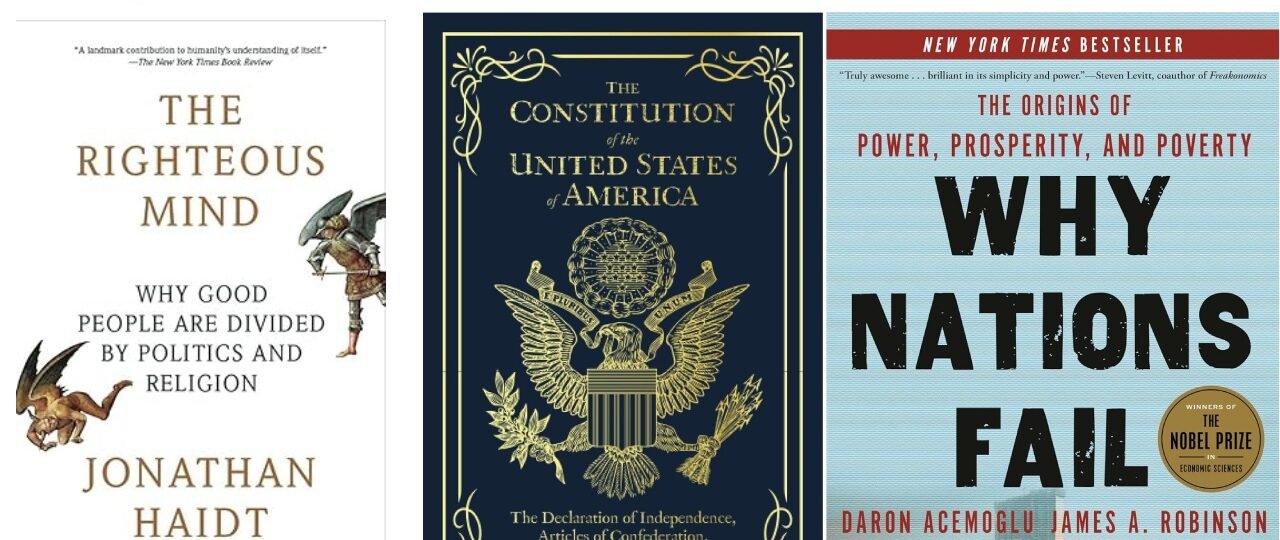You can read Politics Books & Social Sciences books because they’re written for the public, not restricted to academics or experts.
Most of them are nonfiction narratives or analyses that use a clear, organized paragraph structure so readers can follow complex ideas step by step. The topics—like politics, society, human behavior, and history—are meant to be understood, discussed, and debated by everyone, not just professionals.
They’re often written in a long-paragraph format because:
- Explaining big ideas takes space – Social and political concepts often need examples, background, and context to make sense.
- Persuasion and argument – Authors use full paragraphs to build logical arguments, present evidence, and address counterpoints.
- Storytelling for engagement – Even factual books often include narratives, interviews, or case studies to keep readers interested.
- Depth over quick facts – Unlike bullet points, long paragraphs let you explore a topic deeply and see how different ideas connect.
Basically, these books aim to teach and inspire deep thinking, so the long, paragraph-style writing helps readers absorb the subject in detail rather than just skimming headlines.
If you want, I can show you an example summary of a Politics & Social Sciences bestseller written in this longer, flowing style so you see how it works.
The Democrat Party Politics Books Hates America

The Democrat Party Hates America is a political commentary in which conservative radio host and author Mark Levin delivers a strong critique of the Democratic Party’s history, ideology, and influence on American society. Levin argues that the Democratic Party has long pursued policies and agendas that, in his view, undermine the principles on which the United States was founded—such as individual liberty, limited government, and free-market capitalism. The book is unapologetically partisan, aiming to rally readers who share Levin’s concern about the direction of the country.
Drawing on historical research and political analysis, Levin examines the Democratic Party’s evolution from its early days to the present, highlighting what he sees as a pattern of policies that expand government power at the expense of personal freedom. He critiques the party’s positions on issues like immigration, education, law enforcement, and cultural values, arguing that many of these policies lead to societal division and erosion of national unity. The tone is urgent and combative, reflecting Levin’s belief that the stakes for America’s future are high.
Throughout the book, Levin also addresses what he considers media bias, political corruption, and the influence of progressive ideology in shaping public opinion. He makes the case that Democratic leadership often manipulates historical narratives, ignores constitutional limits, and fosters dependency on government programs. For Levin, these actions are not just political disagreements—they represent a fundamental threat to America’s founding ideals.
2. The Righteous Mind Politics Books

Politics Books is a thought-provoking exploration of why moral disagreements—especially about politics and religion—are so deep, emotional, and persistent. Written by social psychologist Jonathan Haidt, the book blends psychology, anthropology, and evolutionary theory to explain how people develop their moral beliefs and why those beliefs can vary so widely between individuals and cultures. Haidt’s central message is that moral judgment is not purely the result of rational thinking; instead, it is rooted in quick, intuitive responses shaped by evolutionary history, social conditioning, and group identity.
Haidt introduces the idea that human morality is built on multiple “moral foundations,” Politics Books such as care/harm, fairness/cheating, loyalty/betrayal, authority/subversion, and sanctity/degradation. Different cultures—and political groups—emphasize these foundations in different ways. For example, progressives tend to focus more heavily on care and fairness, while conservatives often value loyalty, authority, and sanctity more strongly. Understanding this diversity of moral priorities, Haidt argues, can help us see why people of goodwill can still end up on opposite sides of political and religious debates.
The book also emphasizes that our reasoning often serves to justify what our intuitions have already decided, rather than to discover the truth. Haidt uses vivid examples, cross-cultural studies, and personal anecdotes from his fieldwork to illustrate how deeply tribal human beings are. He warns that this tribal instinct can lead to polarization, but also suggests that it can be channeled into cooperation if we recognize our shared humanity and learn to value moral diversity.
3. Government Gangsters

Government Gangsters is a political memoir and exposé in which former federal prosecutor and intelligence official Kash Patel claims to reveal the inner workings of what he describes as the “deep state” in the United States government. Patel argues that a network of entrenched bureaucrats, intelligence operatives, and political insiders—regardless of party—work to undermine elected officials, manipulate public opinion, and protect their own power. Presented as both a personal story and a political warning, the book blends first-hand experiences from Patel’s time in the Department of Justice, the Department of Defense, and the intelligence community with his broader critique of government corruption.
Patel frames the “deep state” not as a conspiracy theory but as a reality of modern governance: an elite group of unelected officials who, in his view, resist accountability and operate above the law. He recounts his role in high-profile political battles, including the Russia investigation, impeachment proceedings, and national security controversies during the Trump administration. Through these episodes, Patel claims to expose how certain media organizations, intelligence agencies, and political leaders work together to push narratives, obstruct reforms, and punish whistleblowers or outsiders who challenge the status quo.
The book’s tone is direct, combative, and unapologetically partisan, appealing primarily to readers who are skeptical of mainstream media and government institutions. At the same time, Patel positions his message as a call to action for Politics Books Americans, urging them to demand transparency, hold government officials accountable, and safeguard the democratic process from what he sees as internal threats. His perspective is grounded in personal anecdotes, insider details, and a consistent theme: that the fight to protect democracy is as much about resisting abuse of power within government as it is about confronting external enemies.
While Government Gangsters is written in a way that clearly supports a particular political viewpoint, it also serves as a case study in how political insiders interpret the tensions between national security, public trust, and democratic oversight. For supporters, it’s a revealing tell-all; for critics, it’s a sharply partisan interpretation of complex events.
4. The Constitution of the United States

This volume is a foundational collection of the key documents that form the legal and philosophical bedrock of the United States. It typically contains three essential texts: the United States Constitution, the Declaration of Independence, and the Bill of Rights. Together, these writings define the structure of the federal government, outline the fundamental principles of liberty and democracy, and guarantee the rights and freedoms of individuals.
The Declaration of Independence—adopted on July 4, 1776—served as the nation’s formal statement of separation from Great Britain. Written primarily by Thomas Jefferson, it asserts the natural rights of all people (“life, liberty, and the pursuit of happiness”) and explains why the colonies felt compelled to break away from a government they saw as oppressive.
The United States Constitution, ratified in 1788, replaced the Articles of Confederation and created a stronger, more organized federal government. It is divided into a preamble, seven articles, and later amendments. These articles establish the three branches of government—legislative, executive, and judicial—define their powers, and create a system of checks and balances to prevent abuse of authority.
The Bill of Rights, ratified in 1791 as the first ten amendments to the Constitution, protects core individual liberties. These include freedom of speech, press, religion, and assembly; the right to bear arms; protections against unreasonable searches and seizures; rights of the accused; and guarantees of due process and fair trials.
5. Why Nations Fail Politics Books

Why Nations Fail is a sweeping exploration of the fundamental reasons why some countries achieve long-term prosperity while others remain trapped in poverty, instability, and stagnation. Acemoglu and Robinson argue that the key to national success is not geography, culture, or even sheer resource wealth, but rather the quality of political and economic institutions. According to their thesis, nations flourish when they build inclusive institutions—systems that encourage participation from a broad segment of society, protect property rights, enforce the rule of law, and create incentives for innovation and productivity. Conversely, nations fail when they are dominated by extractive institutions—arrangements that concentrate power and wealth in the hands of a small elite, discourage innovation, and exploit the majority for the benefit of the few.
The authors draw on examples from across history and the globe, weaving together stories from the Roman Empire, medieval Venice, colonial Latin America, sub-Saharan Africa, and modern states like the United States, China, and North Korea. They show how political centralization combined with inclusivity fosters sustainable development, while centralized but extractive systems tend to generate short bursts of growth followed by stagnation or collapse. One of their central insights is that political institutions shape economic institutions, and that reform is often blocked by elites who fear losing their privileges in a more open, competitive Politics Books.

